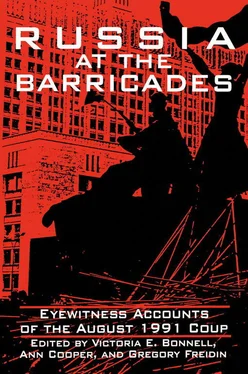The following day, Thursday, August 22, was officially proclaimed the Day of Freedom. Banned newspapers began to publish again, and television and radio programs resumed their regular schedules. Yeltsin made an appearance before the Russian parliament where he thanked Muscovites for having defended the White House so courageously.
At noon, tens of thousands of Muscovites gathered at the White House for a victory rally and a march to Red Square. The speeches by Yeltsin, Ivan Silaev of the Russian Council of Ministers, Russian Vice President Aleksandr Rutskoi, Aleksandr Yakovlev, Eduard Shevardnadze, and other leading figures in the democratic movement attributed the victory over the junta to the “people of Moscow,” who heroically mobilized to defend freedom against “totalitarianism.” The potent admixture of local patriotism and Russian nationalism brought the crowd to a frenzy of delight, with much flag waving and cheering. The speeches continued when the crowds reached Red Square, but Gorbachev was conspicuously absent.
The symbols of victory were everywhere. Many people carried small tricolor flags which had become the symbol of democratic Russia. Later that day, the tricolor was made the official flag of the Russian Republic. The square adjoining the White House was renamed Freedom Square.
On Thursday evening a massive display of fireworks had been arranged to mark the culmination of the day’s events. Perhaps the organizers of the festivities conceived of victory day as a Russian version of the Fourth of July or Bastille Day. But these were not the only fireworks. In Dzerzhinskii Square—named for the head of the infamous revolutionary-era Cheka, precursor of the KGB—an angry crowd had gathered in the late afternoon. Some called for an attack on the KGB building, the Lubianka. It was the first time in four days that popular indignation appeared ready to spill over into spontaneous violence. Soon a delegation came from the White House to calm the crowd and dissuade them from rash actions. Some hours later, a mammoth yellow crane, bearing the logo “Krupp,” arrived in the square and began dismantling the imposing statue of “Iron Feliks” Dzerzhinskii which stood on a tall pedestal in the center of the square.
Gorbachev conducted a press conference on Thursday evening, his first extended appearance since the conspiracy had begun. Many were surprised that the President had chosen as his first audience the press corps and not the Soviet public at large or the people of Moscow, who had risked their lives to, among other things, secure his freedom. At the press conference, Gorbachev appeared shaken by the events, even contrite, yet still unable to grasp (as his critics put it) that he had returned to a different country. In response to a question about the possible complicity of the CPSU leadership in the attempted coup d’état, Gorbachev equivocated. The impression was further amplified when, in response to another question, Gorbachev launched into his all-too-familiar defense of the “socialist idea.” Still the General Secretary of the CPSU, he failed to take advantage of what was, perhaps, the last opportunity to dissociate himself publicly from a party whose leadership had betrayed him and the country by remaining silent during the coup.
The action on Friday, August 23, took place in the sphere of high politics and on television rather than on the streets. For the first time since Monday, Muscovites became spectators rather than actors as the drama of retribution went forward in the chambers of the Russian parliament. Gorbachev and Yeltsin played the leading roles that day as they came face to face for the first time since the crisis began.
Standing like a deposed leader before an angry crowd, Gorbachev was heckled, criticized, interrogated, and disgraced by Yeltsin and other deputies. After Gorbachev finished his address, expressing gratitude to the “Russians” for their role in defeating the plot, Yeltsin walked up to him and insisted that Gorbachev now read aloud the minutes of a meeting of the USSR Council of Ministers held on the first day of the coup, in which Gorbachev’s own cabinet betrayed him. Gorbachev hesitated because the authenticity and accuracy of the minutes had not been established, but Yeltsin went on bullying him, and Gorbachev submitted, reading what turned out to be an inaccurate transcript. Then Gorbachev took questions from the deputies.
From time to time, Yeltsin interrupted the proceedings, declaring with a broad grin that “in order to relieve accumulated tension” he would now sign a decree with far-reaching implications for the future of the country. In this way he made public decrees ordering the Communist Party to cease activities in the armed forces serving on the territory of the RSFSR; suspending publication of newspapers that had cooperated with the junta; confiscating Communist Party publishing houses and printing plants and placing them under the Russian government’s control; and sealing the headquarters of the Central Committee and suspending the activities of the Communist Party in the Russian Republic, pending an investigation into its role in the coup. This last move had momentous consequences, for it signaled the end of the Party’s legal existence in Russia.
On Saturday morning, a massive funeral was held for the three men who had died at the barricades early Wednesday morning. A crowd of tens of thousands of people gathered in Manezh Square to hear speeches made by major political figures, including Gorbachev. Somber and emotional, Gorbachev paid tribute to the three men and announced that he had signed a decree posthumously awarding them the title of Hero of the Soviet Union. The crowd then proceeded to Kalinin Prospect and on to the White House, pausing to hear Yeltsin’s funeral oration, perhaps the most powerful speech of his public career. Marching in the funeral procession were Afghan War veterans, Russian Orthodox priests, rabbis, colorfully bedecked Cossacks, and, of course, defenders of the White House carrying a large tricolor flag. Later that day, Gorbachev resigned as General Secretary of the Communist Party of the Soviet Union and suspended the Party’s activities, extending to the entire country Yeltsin’s decree banning the Party on the territory of the Russian Republic.
* * *
How can we account for the rapid and ignominious defeat of the “gang of eight”? Among the important factors were the ineptitude of the plotters, the general decrepitude of the centralized system of control, and, perhaps most critical at that moment, the Emergency Committee’s inability to command authority among the top brass in the military and the KGB. Their orders to arrest Yeltsin and other key political figures were disobeyed (in fact, only four people were arrested during the coup, all of them People’s Deputies). The conspirators then failed to cut off communications with the White House even after it became the headquarters of the resistance. [21]
The spokesmen of the Emergency Committee did not make a convincing case for themselves at their one and only press conference, where they were openly ridiculed by members of the Soviet press—all of this broadcast live for the benefit of the entire country. More surprising is the fact that they could not even control the content of the one and only television news program, “Vremia,” or the government newspaper Izvestiia . [22]
When rumors of a coup had circulated some months earlier, Gorbachev reportedly dismissed the possibility on the grounds that people like Yanaev were incapable of masterminding a takeover. He was wrong about that, but the plot did in fact unfold like a comedy of errors. By the time it was over, two of the conspirators had landed in the hospital (Pavlov and Yazov); one had committed suicide (Pugo); [23]and another lay unconscious in an alcoholic stupor (Yanaev).
Читать дальше












